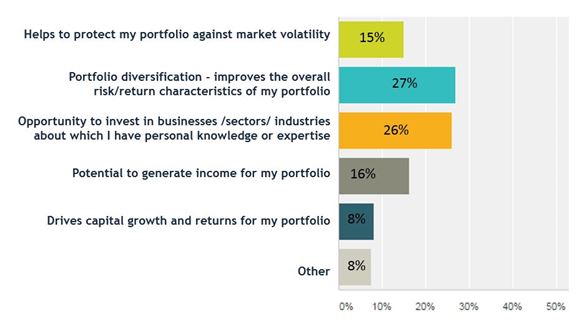Interest in Alternative Investments Driven by Market Volatility

Are the U.S. stock markets still in bull market mode or have they started their journey into bear market territory? Many investors are still confused due to the August 2015 large stock market sell-off.
August 2015 was a traumatic period for many investors. The S&P 500 Index dropped more than 10 percent in a matter of days. It broke the important support level of the 200-day moving average and brought the VIX to its highest levels since 2009. This has left many investors and traders wondering, is this recent sell-off the start of the next bear market in equities?
While some investors (in hindsight) were smart enough to buy into the dip in stock prices, many more were left unsettled by the experience.
A recent study by Pensco Trust Company showed that in a cross section of their clients, 62 percent have increased their allocation to alternative investments, or are planning to in the near future due to recent market volatility. This is not surprising. Investors have definitely been more alert to market volatility since the 2008 financial crisis. The memory of the S&P 500 dropping more than 55 percent in 17 months is still fresh in their minds.
Given the uncertain times investors face, what choices do they have with their retirement funds?
Investors who have money in retirement accounts have the option of using those funds to invest in stocks, bonds, and mutual funds, or invest outside the stock market. The investment options are virtually limitless for what investors can choose. However, many investors are not aware of all their choices.
Fortunately, due to this recent market volatility, more investors are becoming aware of these additional options, and using this new found knowledge to increase their portfolio diversification.
According to the Pensco study, in the first 9 months of 2015, 32 percent of their new accounts invested in real estate, and 35 percent invested in private equity. Anecdotally we have noticed similar trends as well. Investors want performance from their investments, and they see private equity and real estate as reasonable ways to do that.
The State Street Investor Confidence Index, an index measuring the global risk tolerance of the world’s sophisticated investors, is currently at the lowest level of the year after peaking in June. It may be that the investors do not see the potential for investment returns in traditional investments that they do in alternative investments. This sentiment is mirrored by institutional research firms such as GMO, who have (as of the end of Q3 2015) a forecast of negative real returns over a 7-year period for both U.S. stocks and bonds.
If you are an investor and you suspect you may lose money over the next seven years by investing in U.S. stocks or U.S. bonds, why would you invest in those stocks and bonds?
All investors need to be vigilant and continuously assess what they are investing in. As the investors in this study have shown, they see real estate and private equity as areas that are still attractive as an investment. But these are not the only two asset classes to experience increased interest from investors. Other industry professionals have seen an increased interest in private notes, peer-to-peer lending, international real estate, and private placements.
There will be a flood of new investors into alternative investments.
The recent positive SEC vote for Title III of the JOBS Act, has opened the doors for investment sponsors to openly solicit individuals and non-accredited investors. This should be the inflection point of a huge wave of new investors into these alternative investments, who were in many cases prohibited from investing due to their non-accredited investor status.
These non-accredited investors may have been interested in alternative investments for some time with few ways to access them. But now with the passing of the JOBS Act, they will be able to invest alongside other accredited investors. This is a positive trend for the alternative investment market. One that could open the doors to opportunities for investors to invest in their areas of expertise.
Why are investors choosing to invest in alternative investments?
This recent Pensco study showed some of the reasons that investors actively seek alternative investments for their retirement portfolios. The clear winners are that investors are looking for better diversification to improve risk/reward ratios, and the opportunity to invest in areas that they are experts in.

What can you learn from this study?
I am encouraged by these responses in the study. These investors in Pensco’s study are mostly acting rationally. They are seeking better diversification, and doing it by investing in what they know best. As a wealth manager, this is what we encourage our clients to do as well. Some of the best performing investments we have seen have come from investors who invest in their areas of expertise. I hope the trend of positive developments in the alternative investment space continues.
For more articles from Kirk, check out RIA Perspectives from Kirk Chisholm